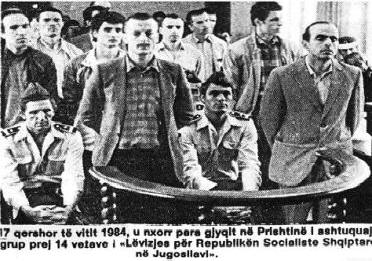Illegal Albanian national movements in Kosovo were formed after the Second World War and operated until the establishment of political pluralism in the Socialist Federal Republic of Yugoslavia (SFRY) in 1990. Until 1966, these illegal groups were mainly right-wing oriented and directly called for the unification of Kosovo with Albania. However, once the relationship between Albania and SFRY developed, and in light of the new political circumstances in SFRY - such as abandoning national criteria for the territorial and administrative division of the country - illegal groups become increasingly leftist. Support for Marxism, Leninism and Hoxhaism can be found almost in every name and political program of these organizations. Through this period, the political programs of these groups shifted from calls to unification with Albania to the unification of Albanian-inhabited territories within a single republic of SFRY to the establishment of the Republic of Kosovo. This shows that no matter which political ideology they tended to follow, these national demands were the backbone of every political program. However, these groups somehow managed to merge two opposing concepts: Marxism-Leninism and nationalism. Keçmezi-Basha highlights numerous studies which show these the difficulties for these groups during the period of illegal Albanian groups in Kosovo (1945–1990). Many Albanian nationalist organizations were founded though their exact number is unknown. However, the most powerful ones include: Lëvizja Nacional Demokratike Shqiptare (Albanian National Democratic Movement), Besa Kombëtare(roughly The National Promise), Organizata nr. 2 (Organization No. 2), Këshilli i të Dymbëdhjetëve(The Council of the Twelve), Organizata Marksiste-Leniniste e Kosovës (Marxist-Leninist Organization of Kosovo), Lidhja Nacional Çlirimtare e Kosovës (Kosovo National Liberation League), Partia Marksiste Leniniste Shqiptare e Kosovës(Albanian Marxist Leninist Party of Kosovo). These groups were made up of a wide array of individuals from across the new nationalist Albanian intellectual class, who aspired to a united and democratic Albania.
Keçmezi-Basha began collecting materials in the 1980s, when publication and distribution from these illegal organizations was still forbidden, and as such it was difficult to find them in archives or libraries. The materials were collected from interviews with, as Keçmezi-Basha notes, hundreds of individuals, including political prisoners and activists. Keçmezi-Basha kept these written and recorded interviews hidden in plastic bags underground. Some materials include the files of political prisoners from judicial proceedings such as evidence of illegal activities. These materials have been edited and published by Keçmezi-Basha.
There was a great number of individuals imprisoned for operating or supporting illegal groups. While Albanians amounted to almost 12% of the total population of Yugoslavia, they constituted 90% of the total number of political prisoners, according to Keçmezi-Basha. It appears that just in Kosovo in 1945 more than 2086 people were sentenced to a total of 14,810 years in prison. Keçmezi-Basha determined that between 1956 and 1980, 901 people were jailed and sentenced to 6,397 years in prison. After the 1981 demonstrations, 3,348 Albanians were sentenced to 25,003 years in prison. According to Keçmezi-Basha the average sentence was 7 years and 1 month (Të burgosurit politik shqiptarë në Kosovë 1945-1990 [Albanian Political Prisoners in Kosovo 1945-1990], Shkup-Prishtinë-Tiranë, 2010).
What makes this collection special is Keçmezi-Basha's many years of research as well as the fact that most of these materials cannot be found in archives, public libraries, or other public records. Keçmezi-Basha notes that during her career she has published around 150 articles, papers, books, and presentations on this topic to different audiences. Some of the materials (newspaper articles, interviews, etc.) are accessible online whereas the rest (books, articles, etc.) can be found in bookstores or online journals. Keçmezi-Basha's work is mainly published in Albanian.

